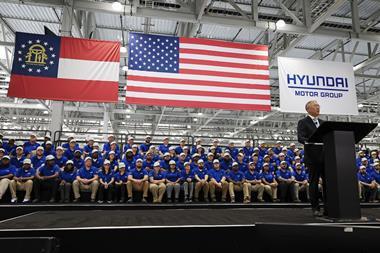 The federal government shutdown in the US, which is moving into to its second week as Republicans and Democrats in the House of Representatives remain in dispute over president Obama’s healthcare reform, is currently having a minimal impact at US ports that specialise in automotive cargo. This is thanks in part to continued funding for security and customs personnel, however, an extended shutdown could impact a range of operations, including overtime pay, infrastructure investment, trade relations and processing times.
The federal government shutdown in the US, which is moving into to its second week as Republicans and Democrats in the House of Representatives remain in dispute over president Obama’s healthcare reform, is currently having a minimal impact at US ports that specialise in automotive cargo. This is thanks in part to continued funding for security and customs personnel, however, an extended shutdown could impact a range of operations, including overtime pay, infrastructure investment, trade relations and processing times.
Indeed, according to one international trade attorney recently quoted in The Journal of Commerce, the shutdown would lead to “catastrophic” delays to cargo imports if it lasts beyond two weeks.
Susan Kohn Ross, an attorney with LA-based firm Mitchell Silberberg and Knupp, said that if the shutdown continues, cargo would back up, forcing shippers to accrue demurrage and storage costs. Importers and exporters whose shipments require paperwork from federal agencies are already facing delays of several hours or more, according to the Journal.
That appears not to have been the case so far for major vehicle-handling ports. Speaking for the American Association of Port Authorities, which represents 130 port authorities in the US, Canada, the Caribbean and Latin America, Aaron Ellis, public affairs director, told Automotive Logistics that it had not heard of any cargo delays from its member port authorities as a consequence of the shutdown, but was continuing to monitor the situation this week.
Likewise, there is no impact yet at the ports of New York and New Jersey. Customs and Border Protection (CBP) personnel, as well as safety and security staff, have not been affected, however there could be issues around budgeting, as will all of the US ports, if the shutdown continues, according to a spokesperson for the Port Authority of New York and New Jersey (PANYNJ). The end of year budget for those staff has not been approved, said the spokesperson, so there is a risk that if the deadlock goes beyond the end of October there could be an impact on overtime. While this would have no impact on finished vehicle trade, it could have an affect on the container trade around the country.
A major factor is the proposed US-EU trade deal currently under discussion. US negotiators were scheduled to spend October 7-11 in Brussels to discuss regulatory issues and harmonisation of standards, but this has now been postponed.
“These negotiations were supposed to limit the tariff placed on trade between the US and the EU which would lower import and export costs, especially on vehicles,” said the spokesperson. “These talks have stopped because the US trade commission isn’t working.”
At the port of Portland on the US West Coast, meanwhile, a spokesperson said that it was yet to experience impacts on cargo volumes or movement but it was something that was being closely monitored in connection with federal agencies.
The Department of Transport (DoT) has temporarily laid off one third of its employees, but has retained employees at the ports whose jobs are in personnel safety. For example, only 46% of the Maritime Administration’s workforce will remain on the job, but 88% of CBP employees will stay in work.
According to Portland’s spokesperson, DOT operations that will continue during the shutdown include maintenance and operation of navigational aids and other facilities, support to reimbursable Department of Defense and Department of Homeland Security activities, hazardous materials safety inspections, security information communication services, and continuity of operations planning, among others. TIGER and other grants programmes within the Federal Transit Administration will be suspended.
TIGER, which stands for Transportation Investment Generating Economic Recovery, is currently funding 52 projects worth a combined total of $474m.

























![Global[1]](https://d3n5uof8vony13.cloudfront.net/Pictures/web/a/d/s/global1_726550.svgz)










